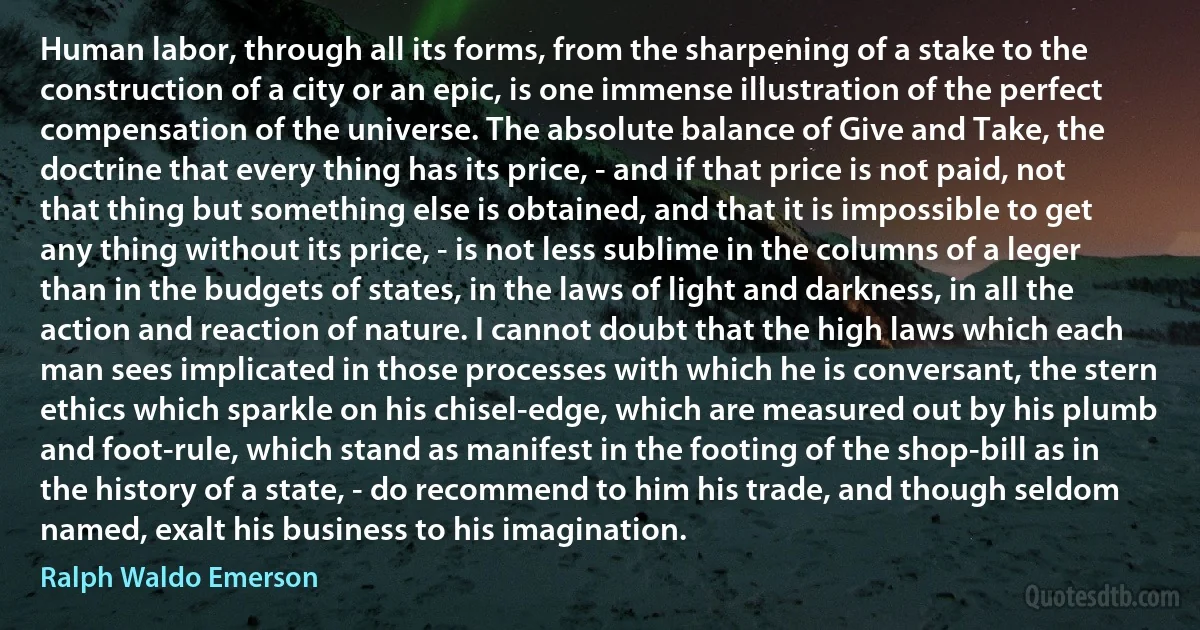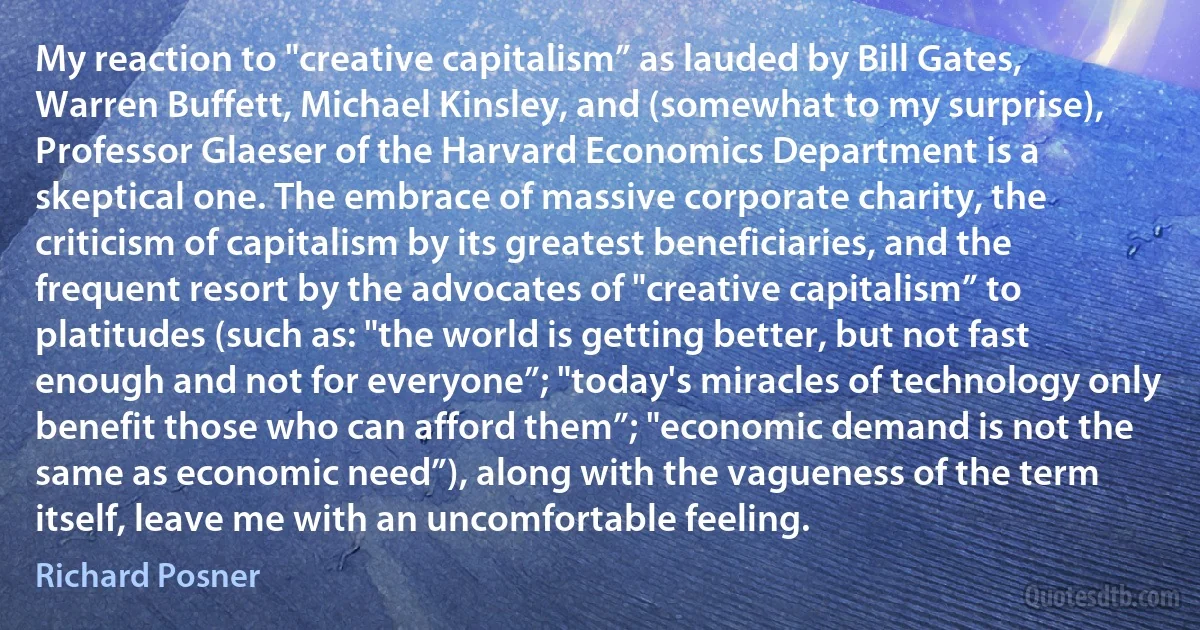Reaction Quotes - page 13
True ignorance approaches the infinite more nearly than any amount of knowledge can do, and, in our case, ignorance is fortified by a certain element of nineteenth-century indifference which refuses to be interested in what it cannot understand; a violent reaction from the thirteenth century which cared little to comprehend anything except the incomprehensible.

Henry Adams
Those who seek education in the paths of duty are always deceived by the illusion that power in the hands of friends is an advantage to them. As far as Adams could teach experience, he was bound to warn them that he had found it an invariable disaster. Power is poison. Its effect on Presidents had been always tragic, chiefly as an almost insane excitement at first, and a worse reaction afterwards.

Henry Adams
The diseases we suffer from the births we get here on earth are all products of actions done by us in previous times. Every action has its reaction and no action goes unrewarded in a suitable manner. Evil actions do not go without their bitter effects upon the doer. Here are given some of the many pitiable conditions of life which man has to live in due to his careless sinful deeds.

Swami Sivananda
Within your system, to kill is obviously a moral crime, but to kill another in punishment only compounds the original error. Someone very well known who established a church -- if you will, a civilization -- once said, "Turn the other cheek if you are attacked." The original meaning of that remark, however, should be understood. You should turn the other cheek because you realize that basically the attacker only attacks himself. Then you are free, and the reaction is a good one. If you turn the other cheek without this understanding, however, and feel resentful, or if you turn the other cheek out of a feeling of pseudomoral superiority, then the reaction is far from adequate.

Robert Butts
Physical activity is an excellent way of using and controlling the effect of aggressive reaction, and will prevent the buildup of aggressive emotions into unsupervised physical constructions, and also prevent the habitual piling up of such aggressions, where detrimental constructions result continually.

Robert Butts
But now for the final exam: If you expect to be a net saver during the next five years, should you hope for a higher or lower stock market during that period? Many investors get this one wrong. Even though they are going to be net buyers of stocks for many years to come, they are elated when stock prices rise and depressed when they fall. In effect, they rejoice because prices have risen for the "hamburgers" they will soon be buying. This reaction makes no sense. Only those who will be sellers of equities in the near future should be happy at seeing stocks rise. Prospective purchasers should much prefer sinking prices.

Warren Buffett
The atrocities are, for me, the most horrible part of the accusation in this trial. They thought that I took it lightly or laughed about it or some such nonsense, in court. That is definitely a mistake. I am the type of person who is naturally against such things and my own psychological reaction is to laugh or smile in the face of adversity. Perhaps that explains my attitude in court. Besides, I was not to blame for these horrors. It's not just that I am a hard man because of my long experience in the army and in politics. It's true that I saw plenty in the First World War and during the air raids and at the front in this war. But I was always a person who felt the suffering of others. To paint me as an unfeeling ogre who laughs in court at the atrocities is stupid.

Hermann Göring
Billy coughed when the door was opened, and when he coughed he shit thin gruel. This was in accordance with the Third Law of Motion according to Sir Isaac Newton. This law tells us that for each reaction there is a reaction which is equal and opposite in direction. This can be useful in rocketry.

Kurt Vonnegut
Herman Cain: My reaction is, that is very insensitive. There are some words that do not basically inspire the kind of negativity like that particular word. And I know that you've refrained from saying that word, so I'm going to say what the word was on the rock. The name of the place was called "Niggerhead". That is very insensitive. And since Governor Perry has been going there for years to hunt, I think that shows a lack of sensitivity for a long time of not taking that word off of that rock and renaming the place. It's just a basic case of insensitivity.
Christiane Amanpour: It was painted over.
Herman Cain: Yes, it was painted over. But how long ago was it painted over? So I'm still saying that it is a sign of insensitivity.

Herman Cain
A change had indeed been brought by the emancipation of the serfs, but there was little outward sign of it. The muzhik remained, to all appearance, what he was before: in fact, as our train drew into St. Petersburg, the peasants, with their sheepskin caftans, cropped hair, and stupid faces, brought back the old impressions so vividly that I seemed not to have been absent a week. The old atmosphere of repression was evident everywhere. I had begun my experience of it under Nicholas I, had seen a more liberal policy under Alexander II, but now found a recurrence of reaction, and everywhere a pressure which deadened all efforts at initiating a better condition of things.

Andrew Dickson White
In this third period (as it may be termed) of my mental progress, which now went hand in hand with hers, my opinions gained equally in breadth and depth, I understood more things, and those which I had understood before, I now understood more thoroughly. I had now completely turned back from what there had been of excess in my reaction against Benthamism. I had, at the height of that reaction, certainly become much more indulgent to the common opinions of society and the world, and more willing to be content with seconding the superficial improvement which had begun to take place in those common opinions, than became one whose convictions on so many points, differed fundamentally from them. I was much more inclined, than I can now approve, to put in abeyance the more decidedly heretical part of my opinions, which I now look upon as almost the only ones, the assertion of which tends in any way to regenerate society.

John Stuart Mill
The fact is that we have realized that in labour disputes the use of violence plays into the hands of the ruling classes justifying the reaction of the military and discrediting the forces from below. Besides the refusal to use violence achieves the possibility of establishing even international solidarities of a very wide range.

Aldo Capitini
My work is about structure. It has never been a reaction to Abstract Expressionism. I saw the Abstract Expressionists for the first time in 1954. My line of influence has been the 'structure' of the things I liked: French Romanesque architecture, Byzantine, Egyptian and Oriental art, Van Gogh, Cézanne, Monet, Klee, Picasso, Beckman..

Ellsworth Kelly



